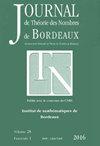用相同的判别式定义单基因域的三次多项式
IF 0.3
4区 数学
Q4 MATHEMATICS
引用次数: 0
摘要
设K是一个带整数环的数字域。对于某些θ∈OK,如果OK = Z[θ],则称K是单基因的。数字字段的单性并不总是得到保证。此外,很少有两个数字字段具有相同的判别式,因此寻找具有这两种性质的字段是一个有趣的问题。本文证明存在无穷多个多项式三元组,它们定义了具有相同判别式的不同单基因三次域。本文章由计算机程序翻译,如有差异,请以英文原文为准。
Cubic polynomials defining monogenic fields with the same discriminant
Let K be a number field with ring of integers OK . K is said to be monogenic if OK = Z[θ] for some θ ∈ OK . Monogeneity of a number field is not always guaranteed. Furthermore, it is rare for two number fields to have the same discriminant, thus finding fields with these two properties is an interesting problem. In this paper we show that there exist infinitely many triples of polynomials defining distinct monogenic cubic fields with the same discriminant.
求助全文
通过发布文献求助,成功后即可免费获取论文全文。
去求助
来源期刊

Journal De Theorie Des Nombres De Bordeaux
MATHEMATICS-
CiteScore
0.60
自引率
0.00%
发文量
35
期刊介绍:
The Journal de Théorie des Nombres de Bordeaux publishes original papers on number theory and related topics (not published elsewhere).
 求助内容:
求助内容: 应助结果提醒方式:
应助结果提醒方式:


